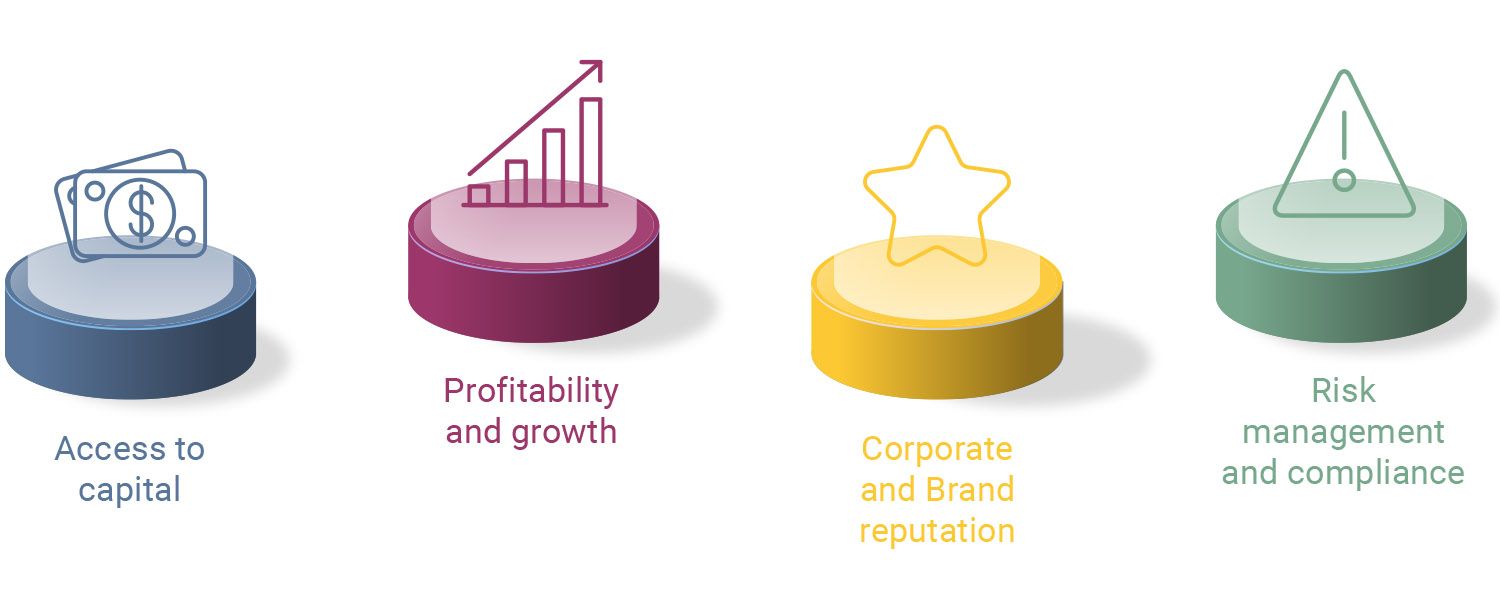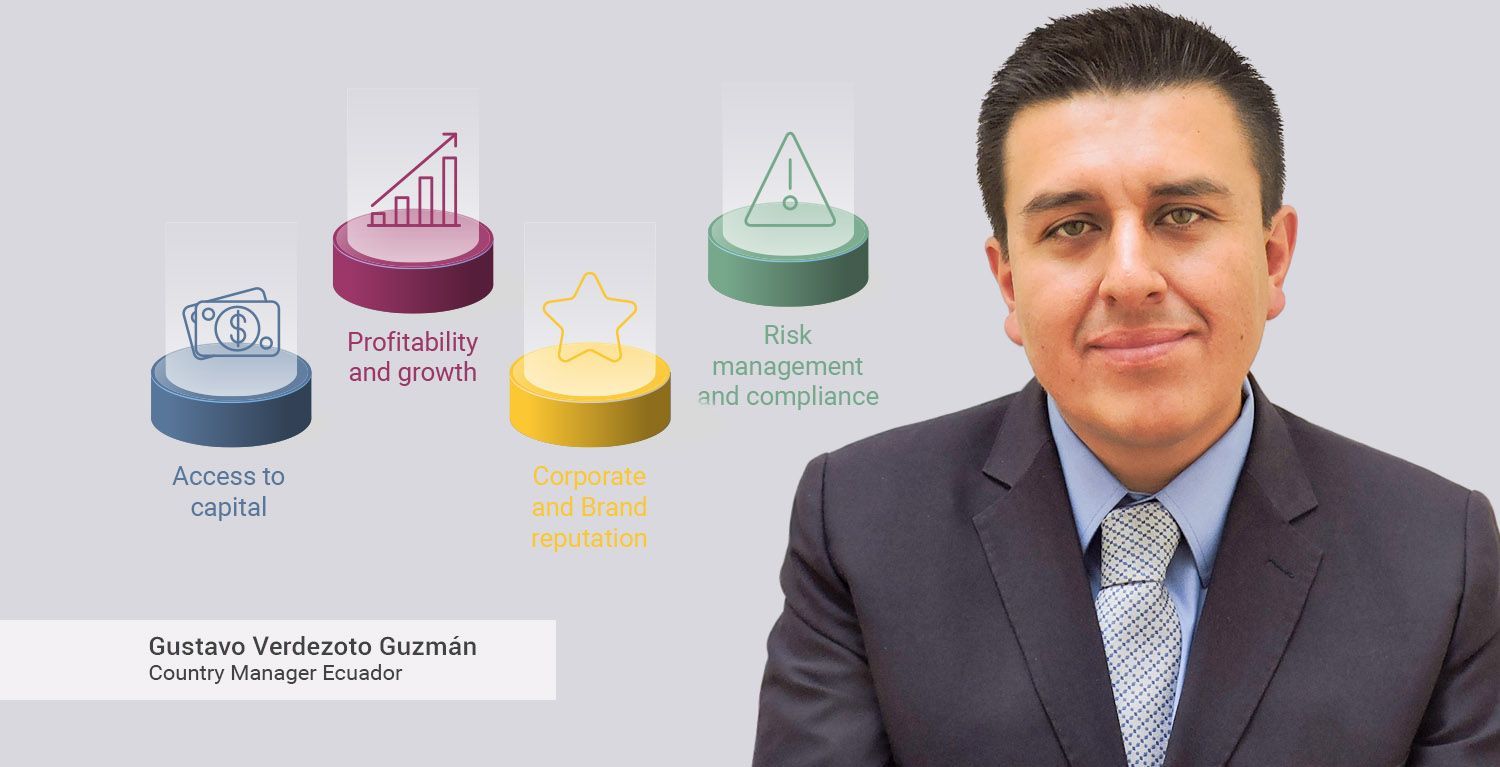In September 2015, the United Nations adopted the Agenda 2030 for Sustainable Development, setting up 17 Sustainable Development Goals (popularly known as SDG), through which pushes countries and their societies in order to undertake a new path that aims to balance environmental, economic and social sustainability worldwide. At a time when we are experiencing dramatic changes that will create a new economic global reality, the business world has demonstrated to be one of the main contributors to ensure the stability of societies by mean of Social Responsibility Actions that strengthen the compliance of the SDG.
Nowadays, investors are interested in knowing in a broad and comprehensive way, how organizations run their management taking into account not just the financial performance of their operations, but also considering social, environmental and corporate governance aspects, in order to integrate the information obtained from these practices into their investment analysis process. Intangible factors such as trust, reputation and long-term viability of the business model, which are not necessarily reflected in financial accounting statements, have become the drivers of an organization’s value.
According to the CNMV (National Comission of the Stock Market in Spain), the business action model, consistent with the Sustainable Development plan, is known as the Tripple Bottom Line, referring to the three dimensions of action that a sustainable company must have and work on: environmental dimension, social dimension and economic dimension, all three integrated in a single business model or project.
For all the above reasons, the Non-Financial Information statement or the Integrated Report acquire relevance. According to the International Integrated Reporting Council (IIRC), the Integrated Report is ‘’a concise communication about how the strategy, the corporate governance, the financial performance and also the prospects of an organization lead to the value creation in the short, medium and long-term’’
The elaboration of an Integrated Report implies a more connected approach to communication, as it refers to how the other resources used by a business (natural, social, human and relational) interact, impact and intertwine with the financial information. In the process of preparing the Integrated Report, usually, the actions carried out in the so-called seven capital principles of an organization (human, financial, intellectual, industrial, natural, social and relational), are evaluated and documented.
The European Union has issued relevant legislation on the issuance of the Integrated Report, Directive 2014/95 of the European Parliament and Council, dated October 22 (2014), related to the disclosure of non-financial information concerning diversity by determined large companies and economic groups. In addition, the Directive was completed with further guidelines of the European Union Commission on the presentation of non-financial reporting.
Nowadays, the common practice stablishes that organizations must report financial information in an independent way from actions about non-financial matters related to Corporate Social Responsibility (CSR). Therefore, the role of the CFO becomes relevant, as he or she has to ensure the proper preparation of information about the overall performance of an entity in order to be measured from different perspectives by the stakeholders. The implementation of an Integrated Report, adapted to new times, is almost a matter of survival for many businesses.
This way of reporting allows all the stakeholders interested in the information generated by the organizations to have a broad view of the business models, corporate strategies, economic and financial perspectives and also about opportunities and inherent risks. In summary, the visibility of the impact generated on society as a whole. Some of the benefits of implementing Integrated Reporting in an organization are the following:

Access to capital
By mean of demonstrating transparency and a comprehensive management, the organization’s ability to attract capital from investors with long-term better conditions is increased. The level of detail in the disclosure of information reflected in the reports about social, environmental, fiscal or economic information, among others, contributes to the long-term success of the operations and, consequently, to the increase in value of the whole organization. This fact allows access to the use of different financing products that promote sustainable development, such as:
- Pension and investment funds: investment and saving instruments composed by the wealth of a group of investors and managed by a managing entity.
- Green and social bonds: issues of public or private debt focused on financing projects with a positive environmental or social impact.
- Social Venture capital: investments with sustainability criteria towards non-listed companies.
- Microcredits: small credits for the undertaking or development of businesses whose main goal is to promote self-employment at a social level, that have difficulties when it comes to financing access.
Profitability and growth
It provides the whole picture of the organization, as it adds value to the corporate strategy and to the business model. As it contains information from financial and non-financial subjects, all those that are interested in the corporate information can have a clearer and more precise context that allows them to fully understand how the company creates, sustains and provides value in the short and long-term. The report allows a deep understanding of the needs that the stakeholders face, what boost innovation and differentiation from competition, generating cost savings, new revenues and risk mitigation, among others.
Corporate and Brand reputation
Increases the transparency of corporate commitments in the management of environmental, social and economic impacts. Informs about the organization’s adherence to ethical standards and regulatory frameworks on environmental, social and corporate governance issues, to the SDG and other relevant to stakeholders.
Reduces reputational, operational, supply chain and regulatory risks, improves brand positioning, increase employee engagement, attraction and retention and also improves the access to markets or to operating licenses. Definitely, the quality of the integrated report affects in a positive way to the perception and confidence of the investors.
Risk management and compliance
It establishes measurement methods for environmental, social and corporate governance policies and practices, which are relevant to the organization. The methodology behind its implementation and use, allows the identification of risks associated to the main activities of the organization and to its value chain, as well as provides higher efficiency when it comes to costs, identifies new business opportunities, consolidates competitive advantages and also facilitates the entry into international markets. These reports are developed and configured as an important and essential tool when carrying out the strategic planning of the organizations.
Undoubtedly, the elaboration of integrated reports is crucial for the organizations, that must define a roadmap with high quality information, in order to document them in a way that fully reflects the value proposition of the organization.
In Auxadi we connect the America with Europe, Latin America and Asia, providing and ensuring value added services to more than one thousand clients distributed among more than 50 jurisdictions.
All information contained in this publication is up to date on 2020. This content has been prepared for general guidance on matters of interest only, and does not constitute professional advice. You should not act upon the information contained in this chart without obtaining specific professional advice. No representation or warranty (express or implied) is given as to the accuracy or completeness of the information contained in this content, and, to the extent permitted by law, AUXADI does not accept or assume any liability, responsibility or duty of care for any consequences of you or anyone else acting, or refraining to act, in reliance on the information contained in this chart or for any decision based on it.




